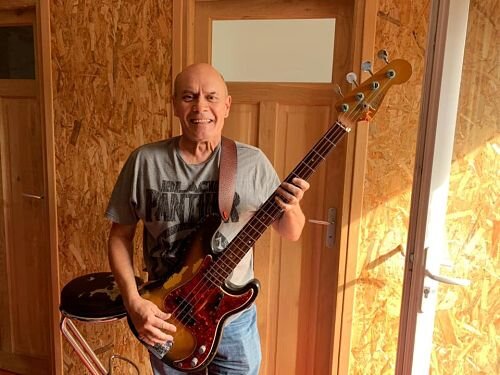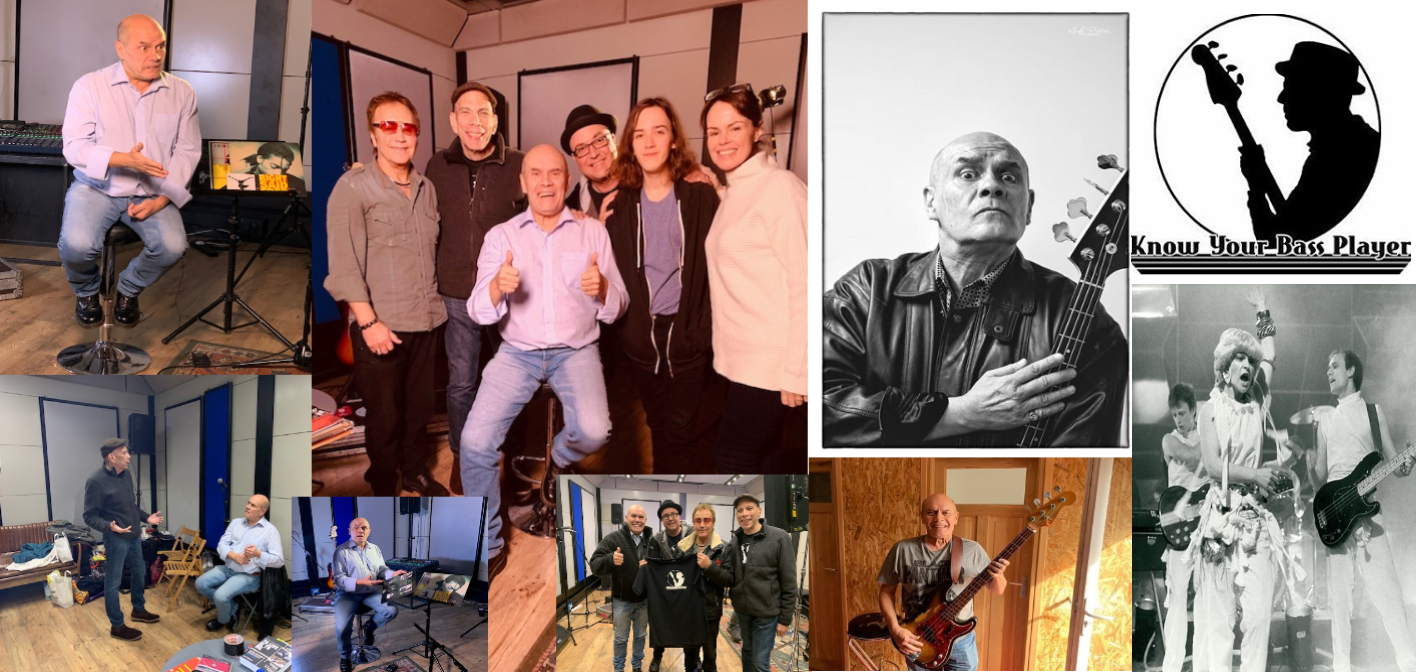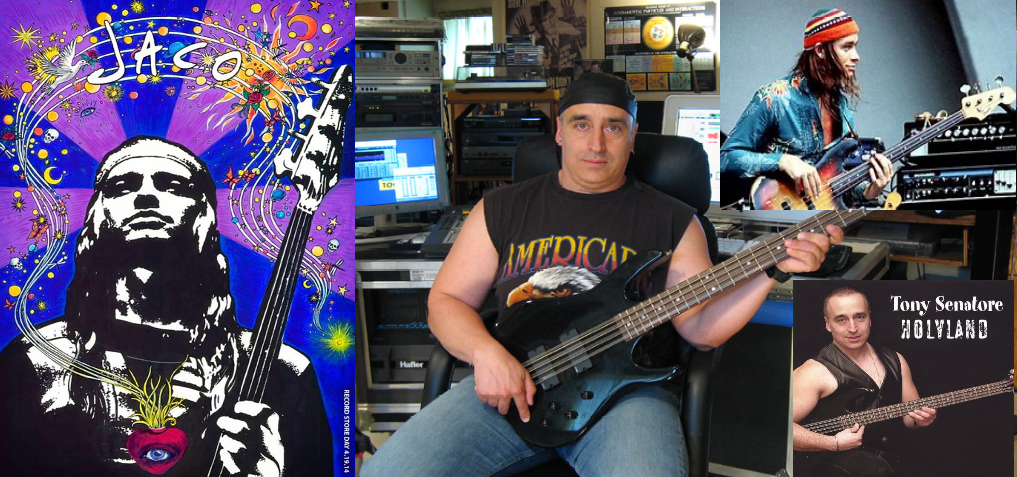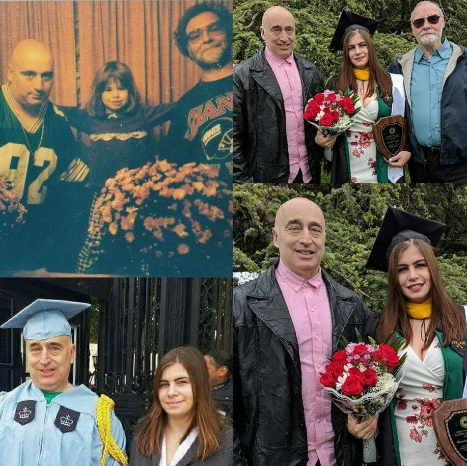The Bass Mastery of Phil Spalding and The Value of Education for the Rest of Us

A body of experience… the acquisition of knowledge or skills through experience, study, or by being taught…
I met Phil Spalding in London in 2019 when I interviewed him for my Know Your Bass Player film series with Mark Preston, Derek Hanlon, and Oliver Harley Symonds. As best as I can recall he was recommended to me by bassist / publicist Dave Clarke, to whom I am greatly appreciative of. I knew of Phil from my record collection: Seal, Terence Trent D’Arby, GTR, Toyah, Mike Oldfield, Ray Charles, Bernie Torme, Right Said Fred, Elton John, Mick Jagger, The Who, and Robbie Williams to cite a select few.
When I interviewed Phil at Terminal Studios in beautiful downtown Bermondsey, I was surprised to learn that he did not study music formally or informally. You can hear Phil explain this to me in the film clip below. I was even more perplexed that he had paying students and hosted lectures on bass education.
How can an “illiterate” musician teach aside from regaling students with tales of rock stardom and demonstrations of his most recognizable bass parts, and provide said audience with tutorials on gear?
Not that there’s anything wrong with telling stories about famous people and places and talk equipment.
When I expressed my stance to Phil – he shot back in the “you can do anything if you work hard, follow your dreams, and are passionate” formulae.
I agree. Though I am extremely pleased that the doctor who removed my cancer and saved my life in 2017 attended med school. Phil challenged me to set up bass lectures in New York City so he could fly in and show me his methodology. Sadly, that dare never materialized due to our conflicting schedules and his untimely passing.
Phil was a natural ala Paul McCartney, and Prince. Phil had the gift of coming up with great parts for great songs by great artists.
His stage presence as a sideman was infectious – you could not take your eyes off the lithe, follicularly challenged performer regardless of the caliber of musicians with whom he shared the stage. Off stage, Phil was a loving, charming, humble cat who loved to eat Kit-Kat bars with a loud crunch whilst other bass players were being interviewed on film. His contribution to the instrument in his era is to be lauded – which is where I am going.
Phil kept our instrument relevant in an age – the 1980s – when synthesizers were pushing the electric bass to the background, and in some instances, eliminating the instrument. Depeche Mode anyone?
Magnificently, Spalding found ways to make our instrument essential among the sonic din of digitally enhanced keyboards and guitars which were all the rage.
And he did it all on a Fender Precision – a tool that was considered a dinosaur in the Reagan / Thatcher years. Phil didn’t change instruments like some players change socks. He made that device work regardless of what was vogue. Akin to Pino Palladino’s use of the Precision on D’Angelo’s watershed Voodoo (2000), Phil made the P bass forever relevant.
So, what did Phil do?
Technically he employed harmonics, muting, slap/pop, hammer-ons, plectrum, assorted methods of finger plucking (atop the string, beneath the string), string bending, trills, alternate tuning, flopping strings, and glissandos among other physical practices. Phil harbored no prejudices to the techniques oft derided by the “bass police.” Can you teach an open mind? Not sure…
Rhythmically he played on top of the beat, behind the beat, ahead of the beat, staccato, legato; he accented off the kick-drum, guitar motifs, vocal inflections and the like. He’d render a reggae groove on a rock tune and play punk eighth notes on a reggae track; he danced around synth lines – to analyze a few. Phil was a daring cat! Be like Phil say I!
Harmonically he would voice lead other than with the root, utilize pedal tones where you wouldn’t expect to hear them, and run a chromatic passage, leave space, utilize 6ths, 9ths, 10ths, 13ths to enhance lyrics and melody; render chords – all in the service of the almighty song. Spalding had a golden ear. Do they sell golden ears at Sweetwater? Denmark Street? Can you get a good used golden ear at Reverb? Not the last time I checked…
Sonically – though a devout Fender Precision practitioner, he did wield a fretless Steinberger XL – both fashionable and functional in its time. Phil also worked every bass pedal known to man and beast. And probably a few others as well. Phil was a timbre chameleon.
Phil was unusually gifted. To negotiate time-signature shifts, abrupt key changes, and complex unison lines – among other requirements of players at Phil’s level – by memory – is challenging even to the most learned of players. And to be called upon to create parts to complement such artists and their compositions is the stuff of world class players. If Phil did that off the top of his bald pate then hats off to Spalding! We should all be blessed with such aptitudes. I get Phil’s theory regarding passion and hard work…
What about the rest of us? What about the other stuff?
Music education cannot teach creativity. Music education cannot make you Phil Spalding, yet it offers you the opportunity to understand what Phil Spalding did – making you a better you -no matter where you are in your career. And music education is not just note reading and a working knowledge of music theory – which is essential and not as daunting as it appears. It’s listening, analyzing, asking questions, and practice, practice, practice.
Music history is also a key to knowledge, improvement, and the joy of discovery.
Phil spoke intelligently of players spanning his hero Phil Lynott to Jaco Pastorius. When I posted social media missives spanning Muscle Shoals, Motown, The Sound of Philadelphia, Funk Brothers, Wrecking Crew, Memphis Stax; Nashville, New York City and London session aces, Leon Russell’s Oklahoma posse, among others, Spalding knew every name and could tell you what made them great. He incorporated those lessons into his toolbox, which made Phil great.
To know where you are going, you have to know where you came from!
Yet, unless a divine (and I’m not referring to actor Harris Glenn Milstead) creator taps your headstock and fills your world with glorious bass lines, as was the case with Phil Spalding as far as I knew him and what he imparted to me on film and in our conversations; education is the best answer.
I am deeply grateful of the brief, rich friendship I had with Phil. His diverse, entertaining, and innovative recorded canon is testimony to the man. Phil was blessed and he blessed us by sharing his talents. I highly advise that you analyze this Phil Spalding playlist, brilliantly compiled by “Didymus” on Spotify.
Godspeed you Phil Spalding, we shall meet once again in that great gig in the sky. I’ll bring my ’76 P bass. You can play it… if you wipe the Kit-Kat chocolate off your fingers!
Phil Spalding Playlist:
Spotify (Entire List): https://open.spotify.com/playlist/3L15ENGPrH7NLikRC67M86?si=37f0d652a1b94ac1
Selections:
“It’s a Mystery” Toyah https://youtu.be/hKDi6ym3Ny0
“Moonlight Shadow” Mike Oldfield https://youtu.be/cL0r7Sc6_BA
“Kids” Robbie Williams https://youtu.be/cvn6eYJh-0c
“Wishing Well” Terence Trent D’Arby https://youtu.be/ynIHsHYaig0
“Goddess in the Doorway” Mick Jagger https://youtu.be/ExtDXLXleSs
“Melt” Melanie C https://youtu.be/k0RBIkWpyd8
“I Want to be Free” Toyah https://youtu.be/c4s7xqntVaY
“I’m Too Sexy” Right Said Fred https://youtu.be/P5mtclwloEQ
“Stars” Dubstar https://youtu.be/b-x6ywUqVvk
“The Key” Roger Taylor https://youtu.be/pNRW6IJLwZA
“Feel” Robbie Williams https://youtu.be/iy4mXZN1Zzk
“Come As You Are” Beverly Knight https://youtu.be/IQNoanH2Iak
“I’m No Angel” Marcella Detroit https://youtu.be/mIZ2OebnURw
“Sexed Up” Robbie Williams https://youtu.be/mBhqMwOl_ZE
“When The Heart Rules the Mind” GTR https://youtu.be/ARERFbiqCfk
“Prayer for the Dying” Seal https://youtu.be/Btl5PYdpcNs
“Loveboat” Kyle Minogue https://youtu.be/FR6C6kNuHKM
“Love Is the Law” Toyah https://youtu.be/O7YicicF9Hg
“Not So Manic Now” Dubstar https://youtu.be/7JHp8Cc3wBY
“Contenders” Heaven 17 https://youtu.be/ARARRPaqNvk
Know Your Bass Player on Film
Phil Spalding Explains How He Became a Bass Player https://youtu.be/SCK4SQt_ADQ


